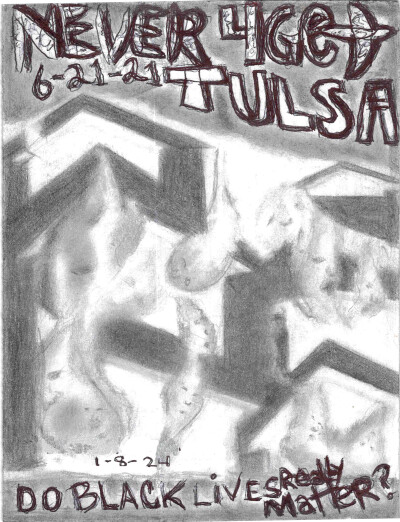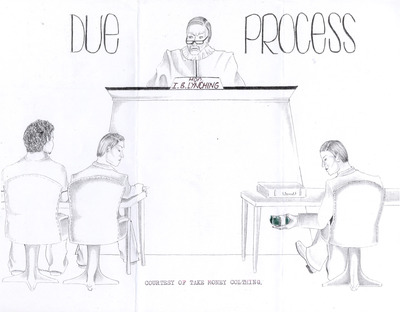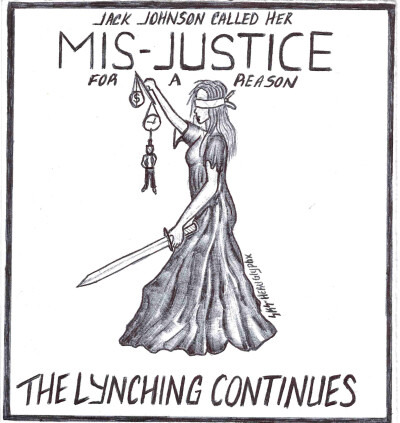On 20 October 2023 I filed a complaint challenging the
constitutionality of the Texas Prison Administration’s contracting with
a private sector, for-profit company in Dallas, Texas to digitalize
all TDCJ-CID prisoner’s incoming personal/general
correspondence and photographs for posting to the SecurusTech tablets
issued to us in May 2023. I paid the full filing fee as well as the
administrative and service fees.
I submit this information and the following to ULK for the following
reasons:
To seek unity across state and federal prison systems currently
under digitalized mail policies.
To provide fellow prisoners in all prison facilities with details
on my challenge to digitalized mail so that we can coordinate a
nationwide attack, and perhaps get an inter-state class action lawsuit
that will be moved to the u.$. Supreme Court.
To hopefully secure a Pro Bono assistance of attorney to ensure
all the bases are covered.
While I was able to cover the initial $500 cost to file the complaint
by sacrificing renewal of several magazine subscriptions and commissary
“luxuries”, I do not have the financial ability to hire counsel or
investigative resources, nor any further admin fees so I am going to
need help.
The complaint’s Constitutional challenge relies on numerous First and
Fourteenth Amendment issues of freedom of speech and due process, to
wit:
1. Exaggerated Response:
TDCJ-CID administration claims the ban on physical mail is to stop
the drugs/contraband that come through USPS mail. However, physical
mail may account for less than 1% of incoming drug contraband, and
such drug-laced articles of mail can be easily detected, isolated, and
removed using the K-9 drug detection units that are maintained on every
TDCJ-CID unit. Everyone, including the prison administration,
knows that almost 100% of the drugs and contraband that enters prison
facilities gets in through one of only three ways:
A. Corrupt admin/security employees.
B. Outside trustees picking up “drop” packets outside the security
fence and bringing or passing them to inside trustees.
C. Private sector deliveries to the prison (kitchen and office
supplies, or vendors for guards’ food orders and commissary supplies)
having “special” cartons containing hidden contraband.
Yet, the prison administration takes almost no measures to check
these primary sources for drugs/contraband.
2.
“Chilling” and/or blocking legitimate freedom of speech and
expression:
As a published op-ed columnist and essayist whose work has appeared
in two syndicated newspapers, and on several internet sites that are
operated by 501.3-c organizations, my readers range from Junior High
students to nursing home residents, Democrats, Republicans, members of
every other political party, housewives, secretaries, police officers
and bartenders.
Often my readers want to write me but the venues I am published in
rarely publish contact info, so readers google me to find out I am
confined at a certain prison facility then google the facility to
determine its address then send their letters to me there.
Prior to the digital mail policy, I received their letters (about
8-12 per week). After the policy, I have received NONE. The unit
mailroom return to sender all “personal/general” mail that comes for a
prisoner without explanation. Hence, this blocks my readers’ letters to
me and “chills” their desire to communicate (they probably think I
refused their letters). Students and the elderly who write me often
don’t know to go to the prison website to check correspondence
rules.
3. Denial of
due process prior to restriction of mail:
I am a Naturist. I don’t use drugs, nor have I ever had anything to
do with drugs. I have never been accused of, charged with, nor
found guilty on any drug-related behavior in any
administrative or criminal hearing, and have never been accused
of or found guilty of smuggling/attempting to smuggle or posses
“contraband.” That is, yet.
Without any form of due process I have been denied my lawful
privilege and right to receive property sent to me (i.e. the physical
letters and photos).
Physical letters and photographs have a sentimental “keepsake” value
beyond any monetary valuation.
The u.$. Supreme and lower courts have held uniformly that
copies/digital images of a document/photograph are not the same
as the original. Ergo, sending me or any prisoner digital copies of
their letters and photos (or even copies) is not giving them
the property their letters/photos constitute.
The u.$. Constitution requires a due process seizure hearing before
government can seize a citizen’s persynal property, whether that
property is land, a vehicle, or an article of mail having value to the
citizen.
Note: If the government, at such a hearing, can produce legitimate
evidence that I have attempted to smuggle contraband/drugs through the
USPS mail into the prison, then and only then would it be legally
justified in enforcing a “digital mail only” rule upon me.
4. The digital
mail “blanket” policy is overly broad:
The number of prisoners who attempt to smuggle drugs/contraband
through the USPS mail is minuscule. 99% of prisoners would never even
consider such a foolish act. Even prisoners who use and traffic drugs
and other contraband generally don’t use the mail because (a) the volume
of drugs that can fit in a letter doesn’t justify the risk and (b) it’s
much easier to get large amounts of drugs brought in by one of the other
venues.
All the digital mail policy does is punish hundreds of thousands of
prisoners who don’t smuggle drugs or contraband in the first place. It’s
analogous with fining the entire town’s citizens for excessive noise
because there’s one “pothead rocker” playing eir stereo too loud.
Most prisoners use the USPS mail in a legal, rule abiding manner and
never try to smuggle through the mail. First and Fourteenth Amendment
rights are fundamental, and mail digitalizing policies abrogate those
rights in an overly broad and exaggerated response to a security issue
that would be more easily (and economically) dealt with in a less
intrusive manner.
These four points (and their consequential points) are the primary
basis of my complaint.
Do prison authorities have a legal right to impose and enforce mail
digitalizing for security reasons? Yes. But only in a reasonable manner
necessary to address the specific security problem without punishing
prisoners who are not a party to the problem. Officials can not punish
innocent prisoners nor strip them of constitutional rights merely
because a tiny fraction of the prison population is causing a
problem.
So if anyone wants to get on board to help get this issue litigated
properly, get in touch with me ASAP. Today is 18 November 2023, don’t
delay.
A comrade at Bridgeport Unit reports: I would like to
inform you of a change in the Law Library Holding list as of November
2023 the Law Library has taken the PD-22 Rules of Conduct out of the Law
Library. It seems as if any ammunition we can use to fight with they
want to destroy it somehow. The other problem is this digital mail is
taking forever to get to one’s tablet. I have received numerous letters
that are 2.5 to 3 months old. This has become a problem for many. I did
receive newsletter #83 in the month of November 2023.
MIM(Prisons) adds: We have reported on the history
of censorship of TDCJ’s own documents in previous issues. While we
had encouraged comrades inside to challenge this legally, one comrade
has informed us that ey believes this to be a faulty strategy. We are
not lawyers, so we provide these ideas for consideration:
TDCJ has the discretion to withhold, or delay, any administrative
documents they may or may not deem to be challengeable in public
information act. There is a logical reason behind certain
“administrative documents” not to be made available for Texas residents
(i.e. friends and families, including incarcerated prisoners off of
general population). I’m sure by now that these certain “administrative
documents” are not censored. For items or certain materials that are
being withheld – whether it be a policy, procedure, regulation, or rule
– it is a fact that a governmental department is not obligated to
disclose public information. Governmental departments are obligated to
disclose public information at the requestor for inspection and review.
See Tex. Gov’t Code, Sec. 552.221 through Sec. 552.235. They are not
censoring. They are REMOVING it. Trickery word.
Filing lawsuits in federal court pertaining to the items or materials
being complained under the claim of censorship is supporting and
encouraging those administrative suits in being DISMISSED (or dismissed
with prejudice). Giving away $350-$400 for free without meaningful merit
to be heard or read…
Please refer incarcerated people in Texas to search out an author by
the name of Raymond E. Lumsden on numerous books: The Pro Se Section
1983 Manual; The Habeas Corpus Manual; Ask, Believe, Receive; The Pro Se
Guide to Legal Research & Writing, etc. These books are available
from Amazon, Barnes and Noble and FreebirdPublishers.com.
A comrade in Allred Unit reported: Just today I
received your mail confirmation letter via my tablet. The letter is
dated 14 September 2023, so it is taking over 2 months to get our mail
and we cannot print it out. TDCJ rules on Digital Mail say that if a
document requires an inmate’s signature it is supposed to be sent to the
unit’s Law Library. I doubt that they will give it to us if it is not
legal work though. They would not allow applications from transition
houses in until recently “Forgiven Felons” got permission to send theirs
in.
MIM(Prisons) adds: The digital mail is making it harder
for us to even track censorship by not allowing prisoners to fill out
and return forms, not to mention blocking opportunities for support upon
release!, or receive notices from the institution as described below.
A comrade at Ferguson Unit reported: When you sent the
ULK 82 & 83 bulk mailings they initially denied them entry, without
giving me notice. They don’t even send such institutional forms like
that via regular mail, it went electronic and i don’t have a tablet
since September so i didn’t even know until early December when i
finally got them to budge and print out the electronic mail. This mail
shit is absolutely showcasing the inadequacy of these state actors and
the exploitative corporations (Securus/JPay).
Warriors in White, a non-profit org supporting restorative
justice wrote: Our newsletter was blanket-banned across the
entire TDCJ system due to a change in mail policy, which required all
mail to be sent to a central mail processing facility. This new policy
was approved on 23 June 2023 but not updated in unit law libraries until
4 August 2023. No reason has been provided. At the end of October 2023,
we received clearance and approval to again distribute the newsletter.
But again, no reason for denial, and no notification for denials and
newsletters returned has ever been provided.
Secondly, all TDCJ residents now rely on Securus tablets to receive
mail. As of the end of October 2023, most are still receiving mail
postmarked throughout August into the first week of September 2023. TDCJ
policy clearly states all mail is to be processed within 72 hours (3
days), through the mail processing facility.
According to the TDCJ Mail System Coordinator, there is a staff
shortage at the facility. Additionally, MSC has claimed they were
unprepared for the amount of mail received at the new facility. This is
quite hard to believe, when the TDCJ, in decades past, has logged
every single piece of mail through its system both on computer
and in paper log books.
According to the TDCJ Ombudsman, all mail is being processed within
the 3 day limit and there are no staff shortages at the mail processing
facility. According to Securus, they are unaware of any mail processing
problems, and that “all mail is processed within 5 days unless it
includes photos or pictures, in which case it may take a little
longer.”
Further, the TDCJ is clamping down on peer-to-peer legal assistance.
If you have a Securus tablet which receives programming from the Freedom
Radio Legal Show on 106.5 The Tank, that info has been banned from the
tablet due to overwhelming listener response. While gratefully received,
TDCJ will no longer accept requests, etc. addressed to the legal show,
one of a long list of new restrictions. So if you sent a newsletter
request to Freedom Radio for a Warriors In White newsletter
subscription, the Polunsky Unit mailroom has been destroying all
requests since the beginning of June 2023 to the present. If you know
someone who applied for the newsletter please resend your request to
WIW-DOM PO Box 301, Huntsville, TX 77342. Please do not send legal
questions to the PO Box as we are not ready for those yet.












